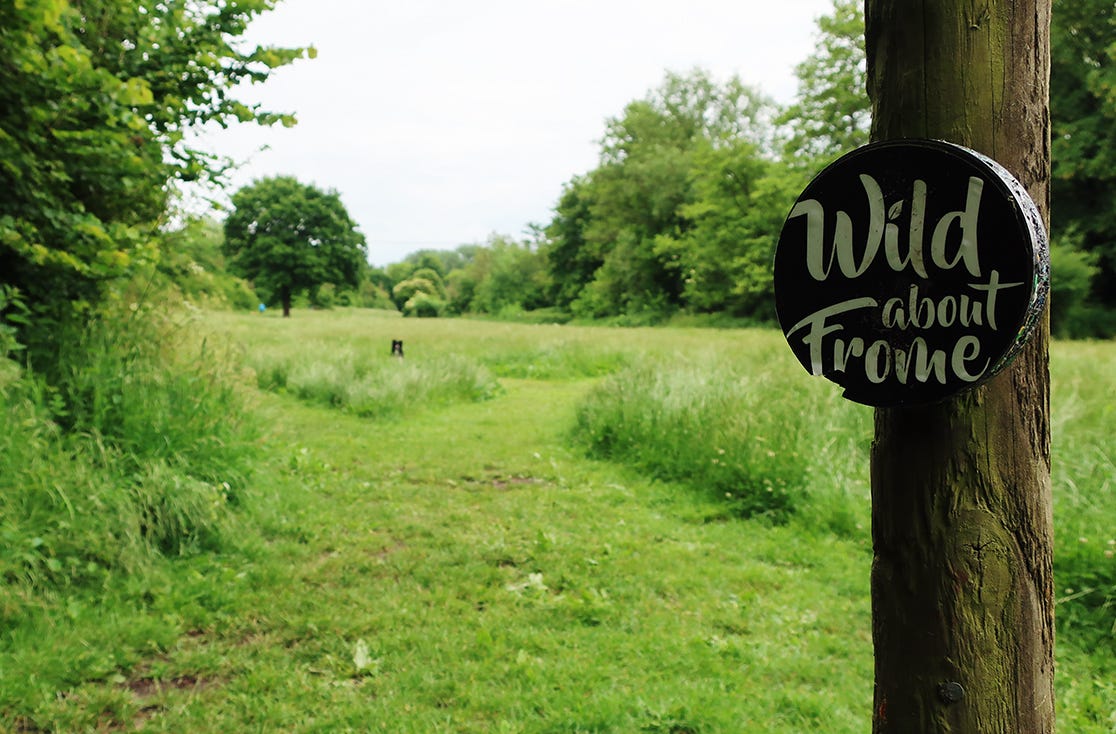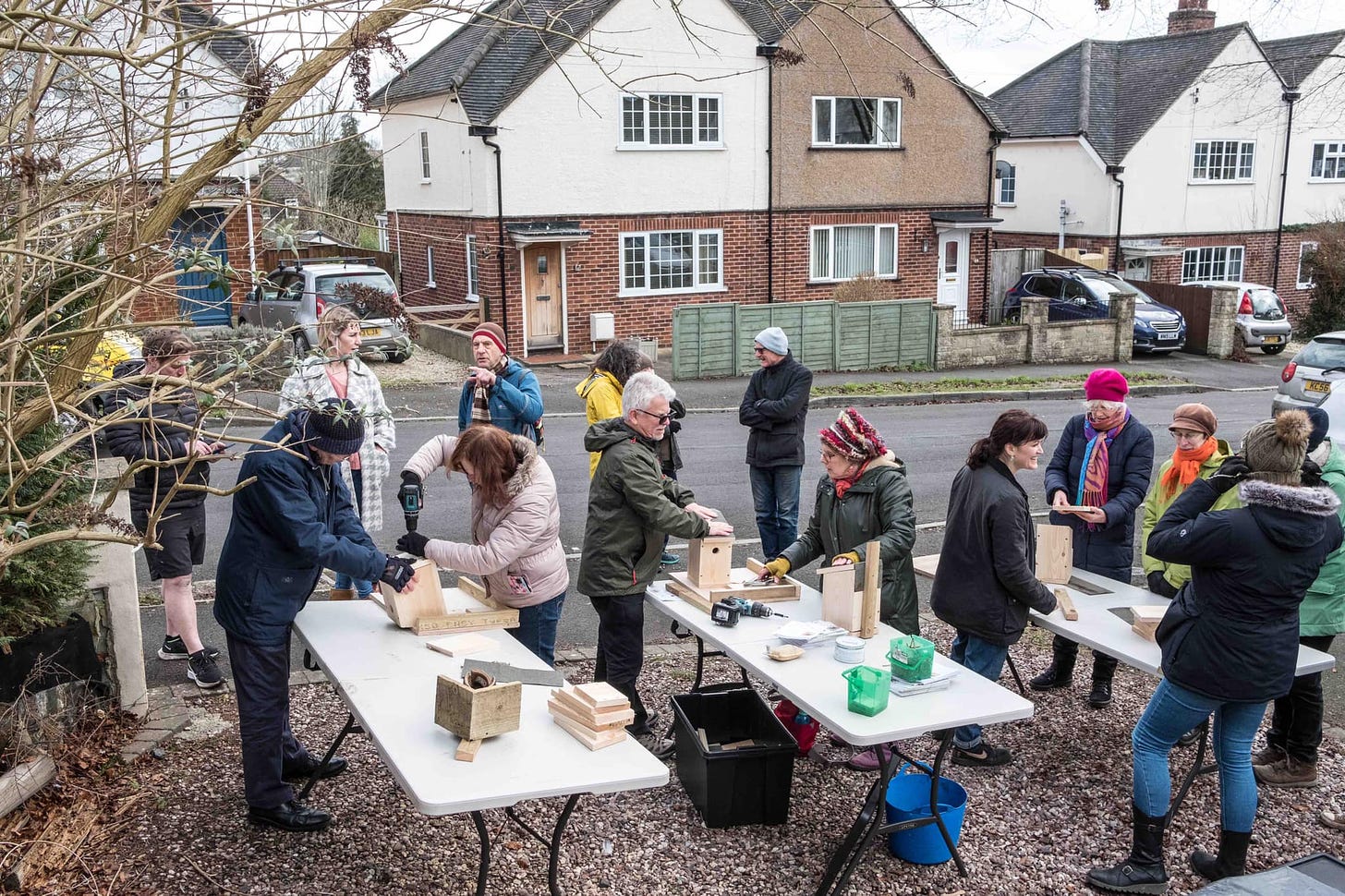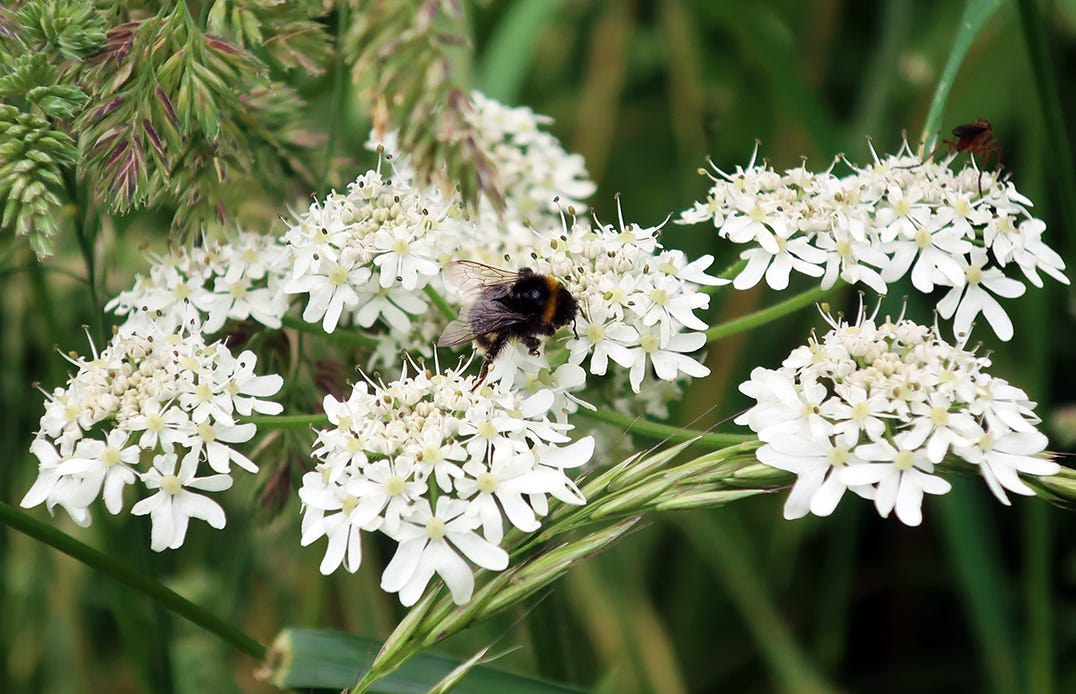To better show off their manor houses, the artistocracy of 17th century England thought it’d be fun to cut the grass on their estates close to the ground as a kind of ‘green carpet’. 1
Where grazing sheep and cattle would normally play this part, human labour was drafted in to keep gardens prim and convey to everyone else that you had more land and more power than you knew what to do with.
As common land was gobbled up, and private land fell into the laps of the more fortunate, others bought into this symbol of status and wealth. From the mid-18th century, the word ‘lawn’ started to become the norm in describing a tended area of grass or turf.
In today’s world, where Britain has lost over 95% of its wildflower meadows2 and many of the species reliant on them, should oppresively-manicured lawns really have a place? The main argument is for the decorative, but walk around Rodden Meadow about now and notice that, in comparison, the conventional garden lawn begins to look quite unsightly.
In her second article for the WFJ, Bee Friendly Trust gardener Claire Jefferies touches on the Frome initiatives encouraging more pollinators to the area, and – like in not mowing our gardens – what you and I can do to foster better habitats for nature on an individual level.

How to help Frome’s bees, by Claire Jefferies
‘If all UK gardens were turned into nature-friendly places, it would create a wildlife haven of over 430,000 hectares in size, more than four times the surface area of all national nature reserves combined’ (earthwatch.org.uk)
When we think of ‘save the bees!’ here in the UK, we inadvertently focus on honey bees. Yet there is just one type in this country – the Western Honey Bee – out of over 270 bee species in Britain, including 25 bumblebee species and more than 220 types of solitary bee. It is, in fact, these latter two species that are endangered, so if we’re going to save the bees, we need to be thinking more broadly than just the Honey Bee.
Bees provide us with many by-products just by virtue of their existence – think beeswax and honey for starters – but, crucially, they play a key role in maintaining vital ecosystems. Around 75% of crops produce better yields when insects and other animals help them pollinate. Of all species, bees are the most dominant pollinators of wild and crop plants, visiting over 90% of the world’s top 107 crops. This means that without bees, there could be no more apples, oranges or coffee, to name just a few foods that could disappear.
Bees pollinate food eaten by other animals and birds, and are key in meat and fish production – losing them would have a domino effect on the food chain because cattle, chicken and fish are all fed on plant products highly reliant on bee pollination. They contribute greatly to the enrichment of our landscapes – the green spaces we rely upon to bolster our mental health would look very different without regular apian attention.
It is hard to quantify bees’ financial value to the world’s food crop industries, but it is definitely in the billions of pounds. They don’t need us in order to survive and we could likely survive without them, but we would probably become ill from a lack of nutrients we need for a balanced diet. Food prices would skyrocket as everyday items would become luxuries.
This all paints a grim picture of our species and planet, yet we don’t have to end up living in such a world. There is so much we can do to reverse bee decline and it can be done by many individuals’ micro-actions. Here in Frome, locals are finding numerous ways to encourage all types of bees and wildlife to visit our porches, gardens and green spaces. Some of which you can just sit back and enjoy, while others you can join in on the action.
Projects to get your tarsal claws into
Frome’s Community Wildlife Mapping project is free to take part in and uses the iNaturalist app (or Seek by iNaturalist for younger users), which records sightings or sounds of wildlife. The project is funded by Mendip’s Climate and Ecological Emergency Fund and run by Frome Town Council’s Resilience Officer Jo Morris in partnership with Somerset Environmental Record Centre.
Jo says: “Hopefully this will give us an indication of how species are doing, what we have here and how we can manage the green spaces even better. It’s easy to plant lots of trees or leave grass uncut, but in other places we might have lots of amphibians that we need to support.”3
Jo visits local schools to help young people reconnect with wildlife. This includes assemblies teaching students why wildlife needs our help and outdoor sessions looking at how we can help pollinators in our gardens, window boxes and schools. She also talks to pupils about providing housing for pollinators. “[Children] often get quite shocked when you ask how much of their plate of food depends on pollination – three quarters of your plate could disappear!” she says.
The Wild Bunch is a branch of Frome’s Neighbourhood Network. It is a citizen-led group supported by the Council and created in response to locals who were looking to do good things in their gardens and communal spaces. “Their main focus so far”, says Jo, “has been wildlife housing, bird and bat boxes, but they also have some pollinator and wild-flower themed events coming up.” Their next event, on the 16th June, is on butterflies and alternatives to pesticides, with local butterfly enthusiast John Samway speaking on his experiences. Then, before the August break, the monthly ‘Wild Bunch on location’ gathering will investigate wildlife at the new pond in Welshmill.45
A balancing act of people and planting
For those of us without a garden, Frome’s parks and green spaces can feel especially important. The town council’s Environment Manager, Chris Stringer, explains how these are managed to support all residents and wildlife. “It’s always a balance to manage green spaces, so many people use them and use them in different ways. Experience says there can be quite polar opposites in what people want from them.’’
Chris describes how these spaces are designated, as is the case with Victoria Park: “We’re not going to mow here as much as we’re going to here. This bit can be for a play area and this bit where grass is a bit longer can be for a wildlife transition zone [for wildflowers]. Spaces need to be for people but our view is increasingly, spaces need to be for wildlife too.”
What can we do as individuals to help bees thrive?
Those minded to check social media regularly may have spotted the #nomowmay hashtag doing the rounds of late. This is a national campaign by the charity Plantlife which has asked the public to do, well, absolutely nothing with their lawns for the month of May. The hope has been to boost the number of flowers and nectar available to pollinating insects. The public are now invited to record the number of flowers in a random square metre of their lawn on Plantlife’s website.
But, whether you have a garden, balcony or porch, we can all do something to support bees:
Continue with #nomowmay where possible to give pollinators additional food into June and beyond
Climate change means a change in weather patterns. This is affecting synchronicity between pollinators and flowering plants. Do successional planting to provide food for pollinators throughout the year e.g., grape hyacinth, snowdrops and also hellebores that flower throughout winter
Similar to the ‘bookshare’ shelves around Frome, install a ‘plantshare’ shelf offering bee-friendly plants and books on pollinators
Bees love the onion family – plant onions, garlic or chives
Install a pot of herbs or flowering plants outside, or a hanging basket or saucer of water with a pebble for the pollinator to land on
Ask your local pub to add window boxes or herb planters in their pub garden
Leave out a pile of twigs or leave patches of soil plant-free for solitary bees to nest in
Add a bee hotel for solitary bees like Leafcutter or Mason bees to nest in. Install one in a sunny, sheltered, not damp spot/wall
Lastly, of course, avoid using pesticides or herbicides on your plants and flowers
https://www.gardensillustrated.com/feature/the-history-of-lawns/
https://www.hiwwt.org.uk/sites/default/files/2020-04/Wildlife%20gardening%20wildlowers%20NB.pdf
If you’re against installing yet another app on your phone, you can simply contact Jo with your sighting instead
For more information, contact the Council’s Hannah Stopford
Later this summer, Jo will ask for local volunteers to help survey the variety of meadow plant species in Rodden Meadow. Contact Jo if you’d like to be involved







